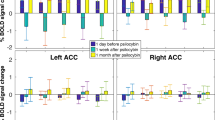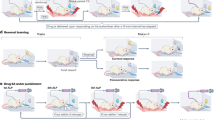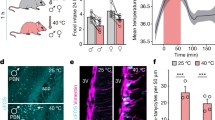Abstract
Drug addiction has been linked to protracted functional changes in neural circuits involved in motivation that can lead to drug dependence, craving and relapse1. Here we investigated the role of the phosphatidylinositol 3 kinase (PI3K) signal transduction pathway in long-lasting behavioral sensitization to cocaine in rats, an animal model of the long-lasting functional changes induced by repeated drug use2. Our results show that PI3K is required for the expression, but not the induction, of behavioral sensitization to cocaine.
This is a preview of subscription content, access via your institution
Access options
Subscribe to this journal
Receive 12 print issues and online access
$209.00 per year
only $17.42 per issue
Buy this article
- Purchase on Springer Link
- Instant access to full article PDF
Prices may be subject to local taxes which are calculated during checkout


Similar content being viewed by others
References
Koob, G.F., Sanna, P.P. & Bloom, F.E. Neuron 21, 467–476 (1998).
Robinson, T.E. & Berridge, K.C. Brain Res. Brain Res. Rev. 18, 247–291 (1993).
Wymann, M.P. & Pirola, L. Biochim. Biophys. Acta 1436, 127–150 (1998).
Vaillant, A.R. et al. J. Cell Biol. 146, 955–966 (1999).
Lin, C.H. et al. Neuron 31, 841–851 (2001).
Sanna, P.P., Cammaleri, M., Berton, F., Simpson, C. & Lutjens, R. J. Neurosci. 22, 3359–3365 (2002).
Pierce, R.C., Quick, E.A., Reeder, D.C., Morgan, Z.R. & Kalivas, P.W. J. Pharmacol. Exp. Ther. 286, 1171–1176 (1998).
Pierce, R.C., Pierce-Bancroft, A.F. & Prasad, B.M. J. Neurosci. 19, 8685–8695 (1999).
Miserendino, M.J. & Nestler, E.J. Brain Res. 674, 299–306 (1995).
Passafaro, M., Piëch, V. & Sheng, M. Nat. Neurosci. 4, 917–926 (2001).
Jackson, A., Mead, A.N., Rocha, B.A. & Stephens, D.N. Behav. Pharmacol. 9, 457–467 (1998).
Bell, K. & Kalivas, P.W. Psychopharmacology (Berl.) 127, 377–383 (1996).
Post, R.M., Weiss, S.R. & Pert, A. Psychopharmacol. Bull. 23, 425–429 (1987).
Acknowledgements
This work was supported by NIH grants DA13821 and MH62140 (P.P.S.), DA08467 (F.W.) and DA04398 (G.F.K.), and a grant from the Patterson Trust (P.P.S.).
Author information
Authors and Affiliations
Corresponding author
Ethics declarations
Competing interests
The authors declare no competing financial interests.
Supplementary information
Rights and permissions
About this article
Cite this article
Izzo, E., Martin-Fardon, R., Koob, G. et al. Neural plasticity and addiction: PI3-kinase and cocaine behavioral sensitization. Nat Neurosci 5, 1263–1264 (2002). https://doi.org/10.1038/nn977
Received:
Accepted:
Published:
Issue Date:
DOI: https://doi.org/10.1038/nn977
This article is cited by
-
mTOR regulates cocaine-induced behavioural sensitization through the SynDIG1–GluA2 interaction in the nucleus accumbens
Acta Pharmacologica Sinica (2022)
-
Phentermine induces conditioned rewarding effects via activation of the PI3K/Akt signaling pathway in the nucleus accumbens
Psychopharmacology (2016)
-
Molecular changes in the medial prefrontal cortex and nucleus accumbens are associated with blocking the behavioral sensitization to cocaine
Scientific Reports (2015)
-
D1 and D2 dopamine receptors differentially mediate the activation of phosphoproteins in the striatum of amphetamine-sensitized rats
Psychopharmacology (2011)
-
IRS2-Akt pathway in midbrain dopamine neurons regulates behavioral and cellular responses to opiates
Nature Neuroscience (2007)



